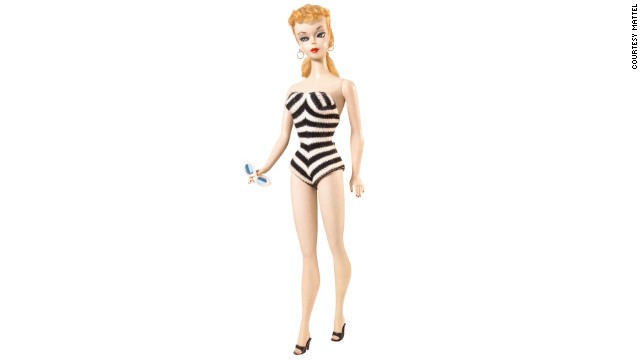Now, she's returning to her "fashion model" roots in an updated version of her iconic zebra swimsuit, and not everyone's pleased.Barbie caused a stir this week when Mattel and Sports Illustrated revealed that she would appear in the 50th anniversary edition of its annual swimsuit edition, which hits stands Tuesday. The partnership includes a promotional cover-wrap that will appear on 1,000 copies declaring Barbie "the doll that started it all," a four-page advertising feature inside the magazine and video outtakes posted online. The doll is also for sale at Target.The official Barbie Twitter account tweeted about the campaign February 10.Responses to the tweet foretold the ensuing controversy, with one person calling "unapologetic" an "ill-advised hashtag." Another person asked if "unapologetic" really meant #sorrynotsorry.A post on "Mommyish" blog, "The Sport's Illustrated Swimsuit Issue Will Feature Barbie, So Your Daughter Can Feel Bad Too," underscored criticism of the partnership for using a children's toy to promote sexualized images intended for adults. It further complicates Barbie's legacy for parents unsure of whether to view her as a positive or negative role model.Mattel, however, stands by Barbie's "unapologetic stance.""This is not a program targeted towards girls. As a brand that is always a part of the cultural conversation, Barbie, for the first time, has an active voice in the debate with her #unapologetic stance. The goal of the campaign is to empower fans to engage and celebrate all that makes them who they are," a Mattel spokeswoman said.The 2014 swimsuit issues celebrates "legends," and Mattel said Barbie is a fitting example."As a legend herself, Barbie has always been a lightning rod for controversy and opinions. Posing in SI gives Barbie and her fellow legends an opportunity to own who they are and celebrate what they have accomplished."For some, it works. As one person said in response to a question posed on Twitter, "no little girl reads Sports Illustrated. It's literally a doll in a bathing suit, calm down society."For others, the issue was not so cut and dry."When you look at the history of Barbie and how she's 'grown' in career choices I believe she's a positive example ... and quite frankly, a more positive image than the SI models," Utah grandmother Holly Albrecht said on Twitter."Children KNOW Barbie is a toy but the 'skinny' models tell society ... that a woman must be skinny to be accepted as beautiful; a far more negative example than Barbie," she said. "Parents need to remember THEY should to be the positive role in their child's life, not toys or Hollywood or athletes."But a growing body of research suggests that children are influenced not only by what they see in the media, but by the toys with which they play."People who say it is just a doll obviously don't realize how it shapes thinking while playing house," nonprofit executive Alia Salem said on Twitter. "If the image of what (you're) imagining yourself as is never attainable and is billed as what to strive for, you'll always be disappointed."Her comments echo why many of the campaign's critics saw something especially "creepy" -- or tone deaf -- in placing a toy intended for children in the pages of a magazine targeting adults."I am #unapologetic for being grossed out by Mattel's desperation. Pairing up with Sports Illustrated to put Barbie on a cover mag? #yuck," digital strategist Jessica Lee said on Twitter.Barbie and the Sports Illustrated swimsuit edition have both been accused of promoting idealized beauty in their own ways. For many, the campaign was problematic because they say the swimsuit edition objectifies women and promoting a homogenous view of beauty."It's actually kind of perfect," said Occidental College professor Lisa Wade, a feminist and media critic. "Barbie is the perfect model for the SI swimsuit issue. It's always been about celebrating conventional definitions of attractiveness for women, and Barbie is an icon of idealized femininity."Both Barbie and the swimsuit issue have been making women and girls feel inadequate for decades. It's a perfect partnership."Others took issue with blurring the line between women as objects and actual plastic objects."Yes, the swimsuit edition is made up entirely of hypersexualized images of women, but this pairing blurs a new line. Barbie is not a woman, she's an inanimate object. Juxtaposing her alongside real women as though the two are indistinguishable is dehumanizing, and in a literal sense, objectifying," said Nicole Rodgers, editor-in-chief of RoleReboot.org, an online magazine that focuses on culture and gender roles.It also comes at a time when many are demanding representations of women without airbrushing or photoshop, she said."Featuring a plastic doll as an object of admiration and desire feels like a slap in the face," Rodgers said.Throughout the controversy, Mattel has remained "unapologetic," citing Barbie's 150 careers, her turns in 26 animated movies and partnerships with renowned fashion designers as evidence that you can be "capable and captivating."But nobody is thinking about Barbie's career trajectory or its positive examples when she's wearing a one-piece in Sports Illustrated's swimsuit edition, said California State University-Long Beach professor Shira Tarrant, author of "Men Speak Out: Views on Gender, Sex, and Power.""I would never want to deny anyone love for Barbie," she said, "but my concern is when we use her to present this hyper-sexualized model of beauty."After all, CEO Barbie and Dr. Barbie weren't the dolls appearing in SI."When you look at how the lives of women have changed since the doll originally launched, the choice strikes me as particularly tone deaf in 2014," said Rodgers, of RoleReboot.org. The fact that "the version they want to focus their marketing blitz on is a sexy bikini Barbie tells us something."(CNN)ANN.Az
Barbie strikes an 'unapologetic' pose - PHOTO
Culture
23:15 | 18.02.2014

Barbie strikes an 'unapologetic' pose - PHOTO
When Barbie burst onto scene in a black and white swimsuit in 1959, she was considered a rebel who embodied both "the sensuality of Marilyn Monroe and the innocence of Debbie Reynolds."
Follow us !










